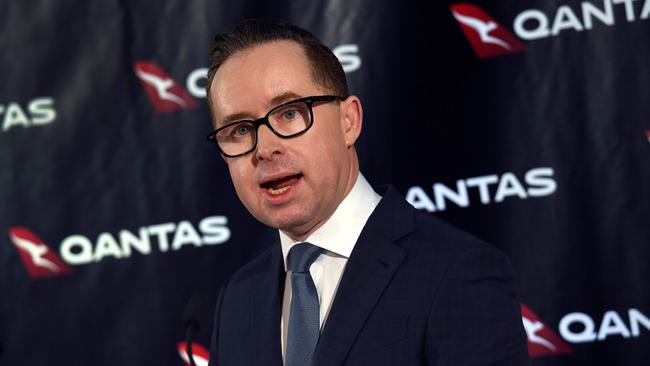Qantas boss Alan Joyce urges energy action
Qantas chief Alan Joyce has added to business calls for greater certainty of energy supply and pricing.

Qantas chief executive Alan Joyce has added to business calls for greater certainty of energy supply and pricing in Australia, but said the nation also needed to be more competitive in taxation and industrial relations if it was to attract more global investment.
After reporting underlying earnings of $852 million, above its previous guidance, and a 25 per cent drop in bottom line net profit to $515m, Mr Joyce also said the election of Donald Trump had not had an impact on Qantas’s US business.
He said more US companies were getting confidence to invest, which would be “good for economic activity and good for travel’’.
Mr Joyce, also a member of the Business Council of Australia board, said it was essential Australia was more competitive globally across all parts of the economy.
“What the business community generally likes is certainty. You want certainty of supply, certainty of pricing,’’ he said of energy policy, before saying that for the BCA, tax and industrial relations were also a focus.
“Corporation tax is going to get out of kilter even more. People make investment decisions on that. If we lose the business (of multinationals), that is not good for our business or the country.’’
Earlier this week packaging billionaire Raphael Geminder said Australians were “regionally and globally naive’’ if they thought local businesses could compete internationally without addressing issues such as energy costs, tax rates and wage rates.
BlueScope Steel chief Paul O’Malley also warned of an “energy catastrophe” in Australia unless new baseload power generation was built to replace ageing coal-fired power stations.
Mr Joyce said he welcomed free trade as Qantas prepared for the arrival of new generation aircraft that would be able to fly longer routes and allow new destinations to be reached.
At a time when margins are being squeezed by soaring capacity worldwide, Qantas maintained a good margin on its domestic and international business and achieved a 21.7 per cent return on invested capital for the six months to December 31.
Its underlying half-year result of $852m was the third best in the company’s history.
The airline declared a fully franked interim dividend of 7c a share. Its shares closed almost 5 per cent higher at $3.72.
Mr Joyce said the airline was enjoying booming demand from Asian visitors, especially from China. He said that even when Asian tourists came into Australia on other airlines, they would often fly Qantas on domestic routes.
“Chinese growth into Australia is unbelievably significant,” he said.
He was also upbeat about the domestic economy.
“There are a lot of positives out there. Qantas generally is optimistic about the outlook both domestically and internationally in terms of the demand profiles there,’’ he said, noting the decline in demand from the resources sector appeared to have bottomed.
While the airline did not offer profit guidance for the second half, it said group capacity would probably rise by 1-2 per cent despite a further 2 per cent reduction in domestic capacity.
Mr Joyce said all of Qantas’s new international routes were performing well and there were none that required any correction.
He said Qantas was outperforming its peers across Asia amid fierce competition. In the half it made more money than Air New Zealand, Singapore Airlines, Etihad Airways, Virgin and Cathay Pacific combined.
“Everybody in the region is having bigger drops, 50 per cent to 80 per cent drops in the profitability,” Mr Joyce said.
“The resilience of Qantas in this space is absolutely amazing because of the structure of our business and what we’ve done in transformation has given us that big advantage.”
While the international business reported a 23 per cent drop in underlying earnings before interest and tax to $208m due to increased capacity, its margin on international operations was 7.3 per cent compared to 4 per cent or less for regional competitors.
Qantas expects international capacity to moderate to about 6 per cent in the second half to June 30, from 11 per cent in the first half.
Mr Joyce said the result showed the benefit of Qantas’s $2.1 billion restructuring program, in which thousands of staff were laid off.
Qantas said its restructuring program was on track to deliver $2.1bn in benefits by June 30.
Qantas’s budget airline Jetstar and its loyalty program reported underlying earnings before interest and tax growth of 5 per cent and 3 per cent, respectively. The latter will return to double-digit growth this half.
Citi told clients the Qantas result showed its strength relative to other carriers, “highlighting that Qantas remains undervalued’’.
Macquarie said it expected capacity reductions and improving conditions to “aid in the recovery of unit revenues’’. It added: “Value is clear and compelling.’’



To join the conversation, please log in. Don't have an account? Register
Join the conversation, you are commenting as Logout